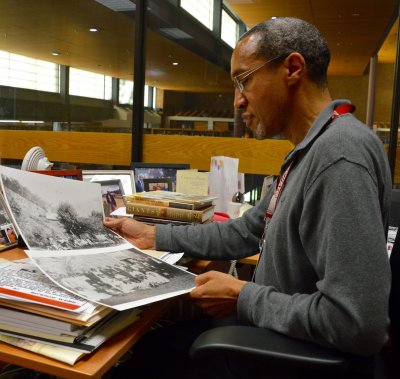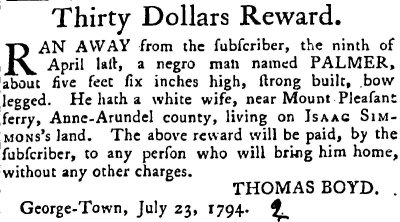
Chris Haley, director of the study of the legacy of slavery in Maryland at the Maryland State Archives, reviews pictures of a staff member's ancestors, one of whom is pictured with his manumission, the certificate of freedom during the time of slavery. (Photo: Brittany Britto)
ANNAPOLIS—Sitting in his office at the Maryland State Archive, Christopher Haley scans through a series of runaway slave ads, a compilation of archives that he’s been working on for the past 14 years.
His desk is sprawled with books about African-American history and genealogy, an interest that began as a child when his grandmother gave him an African-American pictorial book.
But the archive’s director of the study of the legacy of slavery in Maryland would be remiss to say that his uncle Alex Haley didn’t have something to do with where he is now.
Best known as the Pulitzer Prize-winning author of the 1976 novel "Roots: The Saga of an American Family,” Alex Haley told a riveting story about Kunta Kinte, a Gambian man who first landed at the City Dock in Annapolis, Maryland, as a slave in September 1767.
The controversial novel, said to be based on Haley’s family ancestry, was transformed into a popular television miniseries in 1977, and depicted a jolting narrative of African-American history, winning nine out of more than 30 Emmy nominations.
“What he did affected so many people in so many ways,” said Chris Haley, who after years in the theater industry, chose a career that would allow him to further study the missing pieces of his lineage.
But when remembering Alex Haley, Chris Haley remembers him as “Uncle Alex”—a kind and humble individual who would give him $10 bills during his visits to Washington whenever he was scheduled to speak at the Smithsonian.
Chris Haley said “I often have to remind myself how huge that is.”
Alex Haley, after all, took 12 years to finish "Roots," nine of which were used to research his family’s ancestry, Chris Haley said, revealing a connection to Kunta Kinte, a discovery that Chris Haley describes as “amazing.”
‘Roots’ and disputes
Controversy has surrounded the novel, some speculating that Kunta Kinte was a fictional character. Alex Haley was also sued for plagiarism in 1978, a year after the miniseries was released, on the claims that 81 pages of the “Roots” novel was lifted from the novel “The African” by Harold Courlander. Alex Haley agreed to pay a $650,000 out-of-court settlement to Courlander.
“There are some aspects of (genealogy) that you are so incredibly fortunate if you can find where all the puzzle (pieces) fit,” Haley said, emphasizing the fact that his uncle took 12 years to finish the book. “Just from a practical standpoint, why do you wait that long to steal something from someone? It just doesn’t make practical sense to me.”
Chris Haley, however, still has faith that the story is real and about his ancestry.
“I believe that where there are literal, documentary lapses or holes in my uncle’s story ... I’m okay with that ... I know through genealogy there are not ‘ABCD’ type things,” Chris Haley said, emphasizing that genealogy is often complemented by oral tradition.
Alex Haley died in 1992 at age 70.
Despite past controversy, a Kunta Kinte-Alex Haley Memorial still sits at the City Dock of Annapolis, displaying a statue of the author telling stories to three young children of different ethnicities from an open book that sits on his lap—one of the only memorials in the country to pay homage to an enslaved African and his landing in the United States.
The 26th Annual Kunta Kinte Heritage Festival (www.kuntakinte.org) is scheduled for Saturday, and a remake of the "Roots" television miniseries is in production and scheduled to air on the A+E channel in 2016.
Remaking a classic
In the midst of Freddie Gray trials and the concerning eye on mistreatment of minorities, Chris Haley argues that the show’s remake will come at an even more controversial time than when the series was originally released.
“I would hope that it is well done and well received. It’s certainly still a valid story,” Chris Haley said, though he acknowledged that many people, actors especially, see no reason for this classic to be remade.
“It will be interesting to see a more modern take on that story, and where it goes and how it connects with today’s sensibility, especially, quite frankly, because of the racially tense climate (of today),” Chris Haley said, reasoning that the original “Roots” miniseries came shortly after the peak of the Civil Rights Movement. “To show an iconic story like ‘Roots’ is really going somewhere.”
While he says that "Roots" does address man’s inhumanity to man, it also speaks to how white and black people worked together toward a gradual form of equality and success.
Even more, it tells a story—his history.

This runaway ad describes a slave named Palmer, who ran away from his owner, Thomas Boyd, in 1974. Boyd, who offers $30 for Palmer's return, described his physical stature and noted that Palmer was married to a white woman who lives in Anne Arundel County, Maryland. (Photo provided by Maryland State Archives)
“It’s about how a black family persevered through generations to exist and to value their own existence to the point where one of them found their courage and the resources to write about his story and validate the stories of his ancestors, which again is something that all of us have the opportunity to do,” said Chris Haley, emphasizing the importance of record-keeping.
“We may not be able to do it with the depth or breadth as my uncle did. But we all have the opportunity to speak to someone in our family, to jot down either with a pencil or pen or talk into a tape recorder or send emails or write some blog about our family or about our lives. And I think that’s one of the things thing that reinforces and promotes, is that it’s within all of us that we could possibly do this, and respect our own specific lineage.”
Reliving history through records
Much of Alex Haley’s research for “Roots” was conducted with the help of the Maryland State Archives, where Chris Haley oversees thousands of documents for the Underground Railroad Project, an ever-growing archive unveiling the many unknown people who dedicated their livelihood to the abolishment of slavery in Maryland.
Though the people he discovers aren’t as famous as Harriet Tubman and Frederick Douglass (though he’s found record of them, too), these records and newspaper ads bring to light that these the runaway slaves were also punished and jailed, Chris Haley said.
Particularly fascinating are the runaway slave ads.
“These documents show that … however wrong we can agree that slavery was, some aspect of slavery – the fact that black people were property—is one reason why there’s a documentation, a trail to so many (slaves),” Chris Haley said, finding the ads “contradictory” for requesting the return of their slaves as property while describing the slaves’ human qualities.
Provided by slave owners, the ads would include specific details and physical descriptions of runaway slaves, including their age, hair and skin color, height, skill level, details about their escape, and even named their family members and friends in order to best identify them. A reward was often included at the top or bottom of the ad for their return.
Ira Berlin, an American historian, author and distinguished professor at the University of Maryland, noted that many slaves in Maryland would often make their way to Baltimore to travel up the underground railroad to Philadelphia—a relatively easy path in comparison to other states.
Knowing that escapes were likely, slaveholders would often bargain with their slaves, negotiating their freedom for additional years of servitude to their owner, Berlin said.
“The distinctive nature about slavery in Maryland (was) the large free population, which (grew) in the American Revolution and (continued) to grow by 1860,” Berlin said, noting that in the 1860’s there were more freedmen in the state than slaves, eventually leading to the abolishment of slavery, as ruled by the Maryland Constitution, in 1864.


